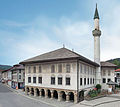Islam in Bosnia and Herzegovina

The Islam in Bosnia and Herzegovina next to Christianity one of the two dominant religions. The number of Muslims in Bosnia and Herzegovina is around two million, which, according to an estimate in 2012, made up 50.7 percent of the country's population and represents the largest religious community in the country. The Muslims in Bosnia are almost exclusively Bosniaks , whose ancestors converted to Islam mainly in the 14th, 15th and 16th centuries (see also Slavic Muslims ). Smaller minorities of immigrant Muslim Albanians , Macedonians and Turks live in the country . General religiosity is increasing.
history
Bosnian War

In the Bosnian War , most of the mosques and almost all historically important ones were deliberately destroyed, mostly small and unimportant mosques were spared. The aim was to remove Islamic culture from the cityscape. In the course of this policy, ethnic cleansing and the targeted destruction of archives, museums and libraries took place (for example the national library by Serbian troops).
| building | Destroyed | Damaged | All in all | ||||||||
|---|---|---|---|---|---|---|---|---|---|---|---|
| of Serbs | of Croatians | All in all | of Serbs | of Croatians | All in all | All in all | Before the war | proportion of | |||
| Friday mosques | 249 | 58 | 307 | 540 | 80 | 620 | 927 | 1,149 | 81% | ||
| Mosques | 21st | 20th | 41 | 175 | 43 | 218 | 259 | 557 | 47% | ||
| Madrasahs | 14th | 4th | 18th | 55 | 14th | 69 | 87 | 954 | 9% | ||
| Tekken | 4th | 1 | 5 | 3 | 1 | 4th | 9 | 15th | 60% | ||
| Türbe | 6th | 1 | 7th | 34 | 3 | 37 | 44 | 90 | 49% | ||
| other Waqufs buildings | 125 | 24 | 149 | 345 | 60 | 405 | 554 | 1,425 | 39% | ||
| All in all | 419 | 108 | 527 | 1,152 | 201 | 1,353 | 1,880 | 4,190 | 45% | ||
Religious identity
In Bosnia, a national and religious awakening can be observed, particularly among the youth, in the course of increased identification with ethnic heritage, largely as a result of the Bosnian War . This development is favored by multimillion-dollar investments made by some Gulf states such as Saudi Arabia, which primarily promote a strictly conservative or fundamentalist interpretation of Islam, which is increasingly displacing the traditionally rather tolerant Bosnian Islam.
Many Muslim women now - especially in the cities - follow the Islamic dress code , which was mostly ignored before the war. On the other hand, the religion enjoys the greatest support from the rural areas of Bosnia and Herzegovina, and less popularity in urban centers such as the capital Sarajevo or Banja Luka .
Islamic Faith Community
Mustafa Cerić has headed the Islamic Faith Community of Bosnia-Herzegovina ( Islamska zajednica , IZ BiH) for 19 years since the Bosnian War . Cerić was replaced in this capacity as Reisu-l-ulema ( Grand Mufti ) of Bosnia and Herzegovina in November 2012 by Husein Kavazović , formerly Mufti of Tuzla. Sejad Mekić , who initially trained at the Elči-Ibrahim-Pascha-Medresa in Travnik , was one of the Muslim delegation participants in the 2nd seminar of the Catholic-Muslim Forum in Rome in 2008 .
Islamic buildings
There are over a thousand mosques in Bosnia and Herzegovina, many of them among the oldest in Europe.
Travnik , Colorful Mosque , early 19th century
Sarajevo , Gazi Husrev Beg Mosque , 1537
Sarajevo , Ali Pasha Mosque , 1561
Počitelj , 1561
Mostar , 17th century
Tuzla , wooden mosque, 18th century
Bugojno , 2001
Sarajevo , Imperial Mosque , 1461
Banja Luka , Ferhadija Mosque , 1579
Sarajevo , Ferhad Begova Mosque
Blagaj , Tekke
Sarajevo , Baščaršija, 1561
Travnik , fortress with mosque
Travnik , Türbe
See also
Individual evidence
- ↑ Popis 2013 and BiH. In: www.statistika.ba. Retrieved August 1, 2016 .
- ↑ Rezultati popisa: U BiH živi 3.531.159 stanovnika. June 29, 2016, accessed August 1, 2016 .
- ↑ a b USA Department of State: International Religious Freedom Report 2007 - Bosnia and Herzegovina
- ↑ U BiH sanjaju islamsku Bosnu
- ↑ The government's Census Bureau does not collect data on religious affiliation. The percentages relate to the estimates in the UN Development Program's Human Development Report 2002 quoted by the US Department of State
- ↑ Maya Shatzmiller: Islam and Bosnia: Conflict Resolution and Foreign Policy in Multi-Ethnic States . Queens University School of Policy, 2002, pp. 100 .
- ↑ a b "Bosnia and Herzegovina: International Religious Freedom Report 2006". U.S. Department of State Offices for Democracy, Human Rights, and Labor, September 15, 2006, accessed January 4, 2011 .
- ↑ Islamization in Sarajevo: Metropolis of Minarets by Walter Mayr, Spiegel, December 24, 2009
- ^ New religious leader for Muslims in Bosnia Zoran Arbutina, Deutsche Welle, October 19, 2012
- ↑ see also rijaset.ba ( Islamske zajednice u Bosni i Hercegovini )
- ↑ acommonword.com: Delegations to the 'Second Catholic-Muslim Forum' ( A common word between us and you )















